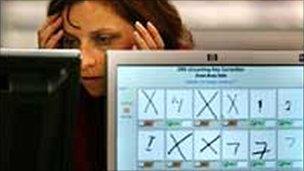Scottish election: Moving on from the 2007 vote fiasco
- Published
When polling stations across Scotland closed on the evening of 3 May, 2007, everyone thought it would all be over by the following morning.
How wrong we were.
The chaos that descended across Scotland saw the suspension of several counts and the rejection of more than 140,000 ballot papers.
Steps have been taken to prevent a repeat, but, with further changes to the system - not least the fact that people in Scotland will be asked to decide for reforms in Westminster as well as Holyrood on 5 May - is there still potential for confusion?
Voting in the AV referendum also means the final election result may not be known until later than usual, given that a number of local returning officers are considering abandoning the traditional overnight counts.
In 2007, the Holyrood and Scottish council elections took place on the same day, and saw the introduction of a new design of ballot paper for the parliament vote, external and a new voting system for the council seats.
Voters were to put crosses on one ballot paper and numbers on the other, while everything was counted by machine.
Confused? It seems many voters were.
The first real concerns on counting night came in the early hours, when the number of spoiled papers in the Airdrie and Shotts seat was confirmed at 1,536 - just 90 votes away from Labour's majority.
By 0400 BST, the Strathkelvin and Bearsden count was suspended, while problems in Edinburgh and Aberdeen and other areas of the central belt emerged.
Shortly after 0700, the Scotland Office, which is in charge of running Holyrood elections, insisted the e-counting system was "working well", saying the results were accurate and final.
A BBC investigation later found tens of thousands of votes in the Holyrood election were rejected by the electronic counting machines without any human adjudication.
Basically, the machines had been programmed to reject some of the new style ballot papers automatically.
It was the middle of the afternoon on Friday before the outcome of the election - a historic win for the SNP - had been decided.
Feelings ran high and my senior colleague, Brian Taylor, even described the events of that night as a "mach five bourach".
In the aftermath, the Electoral Commission brought in Canadian elections expert Ron Gould to look into what happened.
So, how have things changed to avoid a repeat, external?
For a start, the date of the Holyrood election has been separated from council elections, which will take place next year.
Back in 2004, a foresighted backbench Tory MSP named David Mundell tried to bring forward legislation to make this change, but parliament wasn't interested.
Mr Mundell, now an MP and Scotland Office minister, is in charge of running the Scottish election.
Other changes mean that the first-past-the-post vote and regional list vote will be contained on separate ballot papers, with a third paper for the AV referendum.
And there will be changes to what can be displayed on the list ballot paper too.

Problems in 2007 led to the suspension of a number of overnight counts
Remember "Alex Salmond for first minister"?
It was a simple yet effective SNP tactic which saw the phrase appear at the top of list ballot papers (because the first minister's name starts with the letter "A".)
This time round, party names will appear in bold on the ballot papers for the regional vote and, while descriptions (such as, say, "Alex Salmond for first minister") are permitted, they must be registered with the electoral authorities.
And - perhaps more to the relief of the returning officers than voters - there will be no electronic counting.
As well as the changes that people will see, there have also been many behind-the-scenes moves, including the set-up of an electoral management board.
One thing that hasn't changed is the fact that the UK government still runs Scottish Parliament elections.
These are all robust changes which, the Electoral Commission watchdog argues, will keep the gremlins from striking again.
There's an old saying that it's always the voter who decides elections - after what happened in 2007, everyone will be hoping that is exactly what happens.